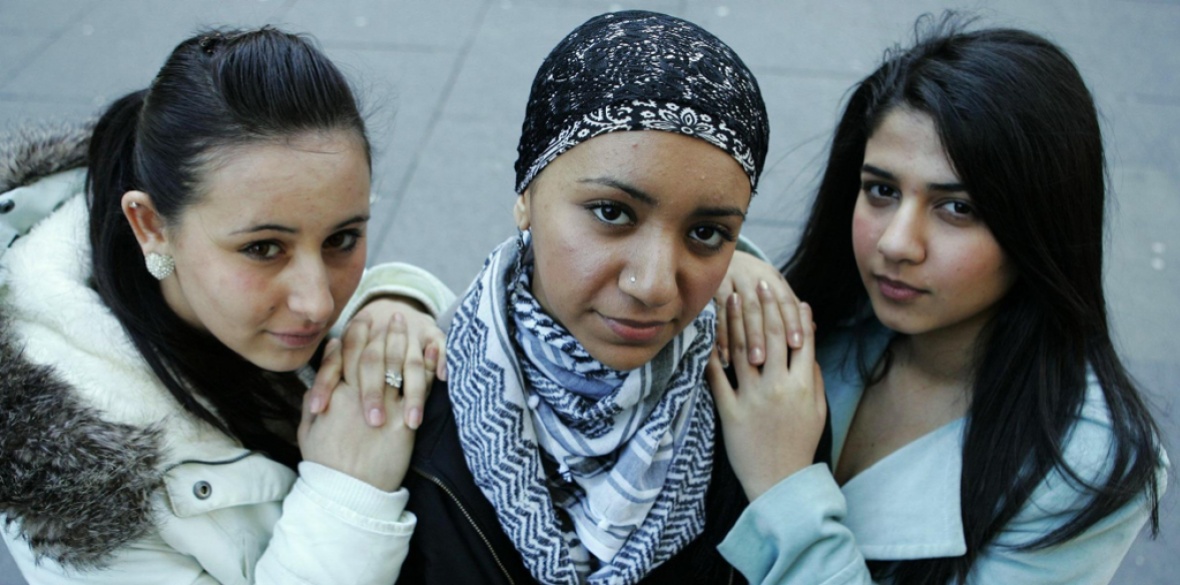This is the last article you can read this month
You can read more article this month
You can read more articles this month
Sorry your limit is up for this month
Reset on:
Please help support the Morning Star by subscribing here
A FEW weeks ago I heard Amal Azzudin interviewed. Amal is one of the Glasgow Girls, a group of young asylum-seekers and indigenous Scots girls who attended Drumchapel High School in Glasgow.
These girls came together in 2005 to protest over the detention of their friend Agnesa, who was arrested along with her family in a dawn raid and locked up in Yarl’s Wood detention centre.
Sustained pressure from the girls, who took their campaign to the media, politicians and the wider community, resulted in the release of Agnesa and her family.
It also kick-started a campaign locally to oppose dawn raids and further removals and to put a human face on the asylum-seeking community.
A small group of older Scottish women, who lived in the same high-rise flats as many of the asylum-seekers, had opened their homes and their hearts to these families and were appalled at their treatment.
They would get up very early to watch out for immigration officials. When they saw them coming, they would phone round all the asylum-seekers who would leave their flats and congregate in the local community centre.
Who knows how many children and families avoided detention and possible deportation by these acts of kindness and dissent? Inspirational stuff.
I was privileged to meet the Glasgow Girls back then. Unison Scotland had also condemned the treatment of asylum-seekers in Scotland, particularly the impact on asylum-seeker children.
Meetings with Scottish government representatives secured a commitment from the then Labour/Lib Dem administration that asylum-seeker children had the same rights as any other child living in Scotland.
The Children (Scotland) Act 1995 meant that the child’s welfare was paramount and that this must be taken into account whenever action was being taken in relation to these children.
Our Unison social work issues group produced a guide for social work members outlining the rights of these children, our members’ responsibilities when working with asylum-seeker children and how Unison would support them. That guide has recently been updated.
We had several meetings with the Glasgow Girls and are proud to call them our friends. It was moving back then to hear their passion and commitment to challenge the clear injustices in the immigration system, their anger and distress when their friends were detained and deported and their delight when their campaigning, their highlighting of these wrongs, bore fruit.
It was even more inspiring to hear Amal speak now and to hear her passion for social justice still loud and clear.
Because Amal and her friends have never given up the fight. They carry on their fearless struggle against injustice and bigotry in their work and their social and political activism.
Amal spoke of her experience of visiting the refugee camps in Greece at the height of the recent refugee crisis and how this has reinforced her determination to speak out, to make a difference.
And it mirrored my own passion and commitment and that of colleagues, friends and no doubt many readers of this newspaper, as we look at all the injustices here and further afield, and wonder if we do make a difference, if we ever can.
But Amal said two things that had a big impact on me. She said: “All we can do is the little things, but that’s what means so much to people.”
And she spoke about young people. Amal spends a lot of time going into schools talking about her own experiences, about the injustices that continue here and around the world and about the power that these children have to make a difference.
I can attest to that from first-hand experience. As a children’s rights officer, I too work with children and young people, many of them in the care of the local authority.
My job is to help them to have a voice in their own lives and to make sure adults listen. That too is a privilege.
Our group of care-experienced young people also works hard and bravely to use their own experiences to improve things for others in the same situation, using their collective power and making a difference.
I came away from hearing Amal feeling humbled and also renewed. Sometimes it can seem like nothing we do makes a difference, but, as young people like Amal have taught us, we must never forget the power of kindness and compassion and the power of the collective.
Whenever we raise our voice against inequality, against oppression and for a more equal and socially just society, it makes a difference and, when that is added to other voices saying the same thing, that is multiplied.
All we can do is what we are doing — striving in our own way to make a difference, but, with young people like Amal and her friends coming up behind us, then we know that the fight will go on.
Kate Ramsden is a Unison NEC member and children’s rights officer.
To view Unison Scotland’s Guide on Refuge and Asylum in Scotland visit mstar.link/UnisonAsylumSeekers.











